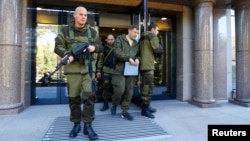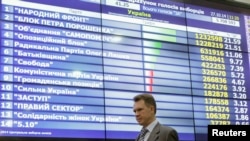Ukraine on Tuesday condemned as "destructive and provocative'' Russia's stance towards elections organized by pro-Russian separatists in eastern Ukraine next Sunday, saying Moscow's recognition of the vote could wreck chances of bringing peace.
The November 2 vote would be held in defiance of Ukrainian national elections last Sunday in which pro-Western parties, dedicated to holding the former Soviet republic together and negotiating a settlement to the conflict, triumphed.
Russia announced Tuesday it will recognize the results of upcoming elections in Donetsk and Luhansk.
Foreign Minister Sergei Lavrov said the voting would be important for the "legitimization of power" in the "People's Republics" of Donetsk and Luhansk, not recognized by Kyiv or the West.
"We expect the elections to be held as arranged and of course we will recognize their results,'' Lavrov told Russia's Izvestia paper and LifeNews TV in an interview published on his ministry's website on Tuesday.
While the rest of Ukraine headed to the polls on Sunday, nearly three million voters were unable to cast ballots in the eastern part of the country, where months of fighting between Ukrainian government forces and pro-Russia separatists has killed more than 3,700 people.
Rebel leaders in eastern Ukraine, who launched a rebellion against the Kyiv government in April, said they would conduct their own poll.
Commenting on last Sunday’s poll, Lavrov said that Russia will likely recognize the results, even though the voting took place “not on all of Ukraine's territory."
"I think we will recognize this election because it is very important for us that Ukraine finally will have authorities which do not fight one another, do not drag Ukraine to the West or to the East, but which will deal with the real problems facing the country," Lavrov said.
Negative reaction
A Ukrainian Foreign Ministry spokesman, Yevhen Perebynis, on Tuesday called Lavrov's comments "absolutely destructive and provocative statements" that "will be interpreted by the terrorists as encouragement by Russia to hold the illegal November 2 elections."
Ukraine's President Petro Poroshenko on Tuesday called the separatists' planned vote "pseudo-elections" that "grossly contradict the spirit and letter" of the peace agreement reached between his government and the rebels last month.
U.S. Secretary of State John Kerry said Tuesday in Ottawa that the rebel-held elections "will be a clear violation of the commitments made by both Russia and the separatists" that they back the peace agreement, the French news agency reported.
US position
President Barack Obama said Monday in a statement that the United States will not recognize elections in separatist-controlled areas unless they comply with Ukrainian law and are held with the consent of the Ukrainian government.
In the rest of the country, with almost 85 percent of the votes counted from Sunday's parliamentary elections, two pro-Europe parties are in the lead.
Ukraine's Central Election Commission reports Prime Minister Arseniy Yatsenyuk's Popular Front and the bloc headed by President Petro Poroshenko each have about 22 percent of the vote.
The likeminded Self Help Party of western Ukraine was in third place with about 11 percent, while the Opposition Bloc, made up of allies of ousted Moscow-backed president Viktor Yanukovych, was fourth with nearly 10 percent.
Poroshenko and Yatsenyuk both back closer ties with the European Union and both have campaigned for reforms widely seen as needed to pull the country back from the brink of bankruptcy. Coalition talks are underway.
The United States has hailed last Sunday's election as "another important milestone in Ukraine’s democratic development," pledging continued support for "Ukraine’s sovereignty and territorial integrity," according to a statement issued Monday by the White House.
Tensions remain high in eastern Ukraine, despite a September cease-fire between Kyiv and the pro-Russian separatists. Heavy shelling Monday rocked the outskirts of the rebel stronghold of Donetsk, but city authorities reported by evening the situation was quiet.
Kyiv and a host of Western governments accuse Moscow of orchestrating and directly supporting the rebellion as part of effort to destablize Ukraine for taking a pro-Europe course.
Russia has rejected the charges, with President Vladimir Putin accusing the West of backing a "coup d'etat" that toppled the Yanukovych government.
Next IMF tranche in question
A second tranche of a $17-billion loan package from the International Monetary Fund which Ukraine was to receive before year’s end is now unlikely to be disbursed, the country’s Finance Minister Oleksander Shlapak said on Tuesday.
Under pressure to support its budget, make debt payments and prop up its currency, Kyiv had expected to receive a second tranche, worth $2.7 billion, in December following an IMF mission visit later this month. That visit is now unlikely to take place before a new government is formed, Shlapak said.
“An [IMF] mission will come when a new government is in place,” Shlapak told journalists. “They want to talk to a new government. The key question would be the adoption of a realistic 2014 budget.”
Shlapak added that he expected for the tranche to be released sometime next year.
The IMF mission would also decide how much additional assistance Kyiv may need. It had previously said that the country might require $19 more billion in loans if the conflict with separatists in the country’s east is not settled by next year.
Some information for this report came from Reuters.






